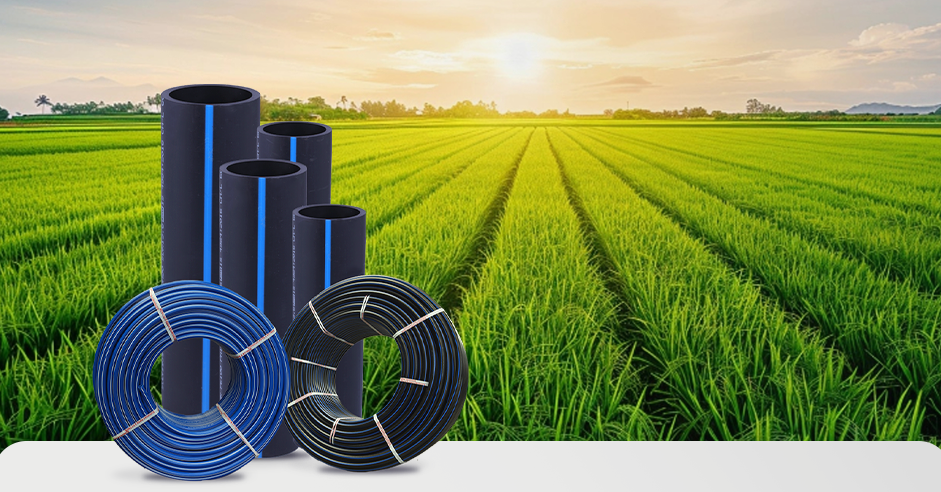Recognizing the Trick Conveniences of HDPE Pipeline for Water and Wastewater Administration
Using HDPE pipe in water and wastewater management offers numerous benefits that warrant consideration. Its remarkable sturdiness and long lifespan make it a favored choice for many tasks. Furthermore, the material's resistance to deterioration and chemical damages improves its integrity in various atmospheres. The benefits prolong beyond simply durability and resistance. Pipe Supplier American Plastics Midland. Exploring its cost-effectiveness and environmental effect exposes much more compelling factors for its extensive fostering in modern-day infrastructure
Phenomenal Sturdiness and Long Life

HDPE pipeline stands apart for its phenomenal durability and longevity, making it a recommended choice in water administration systems. Created from high-density polyethylene, these pipes can stand up to significant stress and stress and anxiety, ensuring trusted performance with time. Their robust nature permits them to withstand extreme environmental conditions, including temperature changes and dirt movements, which can trigger other products to stop working.
The life-span of HDPE pipelines frequently exceeds 50 years, supplying an affordable remedy for districts and markets alike. Furthermore, the product's light-weight homes simplify installation, decreasing labor prices and durations. This sturdiness decreases the requirement for frequent repair work or replacements, even more boosting its financial charm.
In water administration applications, the reliability of HDPE pipes suggests less disturbances and boosted service continuity, making them integral to sustainable framework growth. The combination of sturdiness and longevity strengthens HDPE's role as a keystone in reliable water administration remedies.

Resistance to Rust and Chemical Damage
While many products give in to corrosion and chemical damages in time, HDPE pipelines exhibit amazing resistance, making them perfect for numerous water monitoring applications. This strength stems from the molecular framework of high-density polyethylene, which is inherently non-reactive and does not wear away like metals or weaken from exposure to severe chemicals. Therefore, HDPE is very effective in atmospheres with hostile materials, such as wastewater systems that might include acids, bases, and organic solvents.
In addition, HDPE pipes can withstand environmental variables such as dirt acidity and saline conditions, even more boosting their viability for varied applications (Texas hdpe pipe manufacturer). Their ability to preserve structural stability in time decreases the danger of leaks and failings, which is important in guaranteeing the security and integrity of water distribution and wastewater administration systems. The resistance to corrosion and chemical damage markedly contributes to the total effectiveness and long life of HDPE piping remedies.
Cost-Effectiveness and Financial Advantages
When thinking about the economic ramifications of water management systems, the cost-effectiveness of HDPE pipelines ends up being noticeable. These pipelines provide lower installation and maintenance expenses compared to conventional products like metal or concrete. Their lightweight nature streamlines transportation and installation, resulting in minimized labor costs. In addition, HDPE pipes display a lengthy life-span, usually exceeding 50 years, which translates to less replacements and long-term cost savings.
Additionally, the resistance of HDPE to corrosion and chemical damage reduces the need for costly repair services and substitutes. The pipes likewise support efficient water circulation, lowering power costs linked with pumping systems. By minimizing leakages and water loss, HDPE pipelines add to substantial economic benefits for districts and sectors alike. On the whole, the first investment in HDPE piping can produce considerable economic returns over the life expectancy of the water management system, making it a sensible choice for sustainable infrastructure growth.
Ecological Sustainability and Decreased Effect

Convenience and Flexibility in Setup
Since of their one-of-a-kind homes, HDPE pipelines supply remarkable adaptability and adaptability in installation, making them ideal for a large range of applications. Their light-weight nature enables much easier handling and transportation, reducing labor expenses and installment time. HDPE pipes can be curved and shaped to fit different terrains and job demands, which is specifically useful in challenging settings.
In addition, their resistance to deterioration and chemical damage enables installment in diverse settings without the demand for specialized safety coatings. The ability to fuse joints creates a continuous, leak-free system, improving the overall integrity and reliability of the setup. HDPE's versatility likewise suits ground motion, minimizing the threat of damages in areas prone to moving soil. Overall, these characteristics make HDPE pipelines not just versatile however additionally a preferred selection for water and wastewater monitoring systems.
Frequently Asked Questions
How Does HDPE Pipe Compare to PVC in Water Administration Applications?
HDPE pipeline supplies remarkable adaptability, resistance to corrosion, and toughness contrasted to PVC. Its lighter weight promotes easier installation, while its long lifespan reduces replacement costs, making street elbow HDPE a recommended selection in water monitoring applications.
What Is the Life-span of HDPE Piping Under Regular Problems?
Under normal problems, HDPE pipelines can have a life expectancy ranging from 50 pvc to copper fitting to 100 years. Their sturdiness and resistance to rust contribute to their long-term efficiency in different applications, making them a reputable option for infrastructure.
Are HDPE Pipes Recyclable After Their Service Life?
Yes, HDPE pipelines are recyclable after their solution life. Midland TX HDPE Pipe Fittings in Stock. They can be refined and repurposed into brand-new items, significantly decreasing ecological effect and promoting sustainability within the sector, making them a green option for piping options
What Is the Setup Process for HDPE Water Lines?
The installation procedure for HDPE pipes entails site preparation, trenching, pipeline combination or mechanical joining, backfilling, and pressure screening. Proper methods assure a long lasting and efficient system for transferring water and wastewater properly.
Can HDPE Pipes Be Utilized for Both Safe And Clean and Non-Potable Water Solutions?
Yes, HDPE pipelines can be used for both drinkable and non-potable water systems. Their adaptability, sturdiness, and resistance to deterioration make them suitable for different applications, making sure secure and efficient transport of water in different contexts.